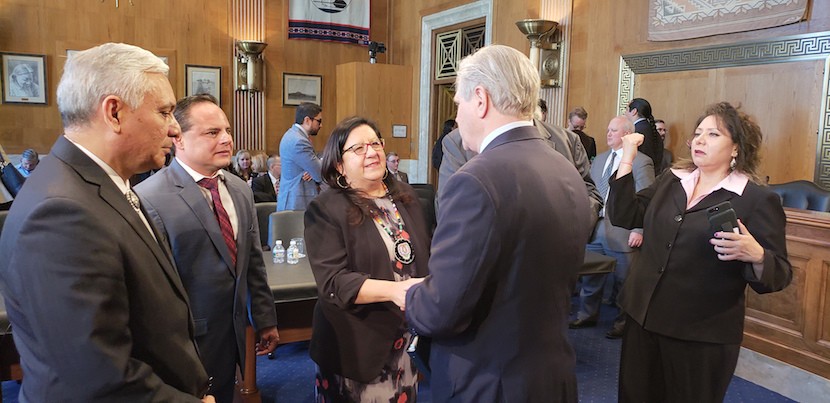
Chief Executive Melanie Benjamin was invited to testify before the U.S. Senate Committee on Indian Affairs on April 18 to support self-governance amendments that have been in the works for nearly two decades. Titled “The 30th Anniversary of Tribal Self-Governance: Successes in Self-Governance and an Outlook for the Next 30 Years,” the hearing focused on progress to date and improvements still needed. These improvements would further reduce bureaucracy, promote greater self-governance, and expand tribes’ ability to tailor federal programs to meet their own needs.
Under Chief Executives Art Gahbow and later Marge Anderson, the Mille Lacs Band was a tribal self-governance pioneer. In the late 1980s, an investigation revealed that only 11 cents of each federal dollar appropriated to the Bureau of Indian Affairs (BIA) reached Native people. Chief Executive Gahbow and a small group of tribal leaders traveled to Washington, D.C., to help develop a new approach.
That approach became the self-governance program – part of the Indian Self-Determination and Education Assistance Act Amendments of 1988. The Mille Lacs Band became the first tribe to negotiate a self-governance compact with the BIA in 1990.
Senator John Hoeven (R-ND), chairman of the Senate Committee on Indian Affairs, convened the April 18 hearing, describing the Indian Self-Determination and Education Assistance Act Amendments of 1988 as “one of the most successful laws in Indian history” and “a significant turning point.”
Today, 270 tribes are self-governance tribes. In her testimony, Melanie asked, “After 30 years, why aren’t more of the 573 federally recognized Indian tribes participating? And why is only $160 million of the BIA’s annual $2.4 billion appropriation being transferred to Indian tribes under self-governance authority? And why … is the mandatory reach of tribal self-governance authority still limited only to BIA and not … the rest of the Department of the Interior?”
She urged the passage of amendments that will bring more federal funding to Native communities and serve a broader array of programs and services.
Photo: Chief Executive Melanie Benjamin testified April 18 before the U.S. Senate Committee on Indian Affairs. She is pictured with James Floyd, Principal Chief of the Muscogee (Creek) Nation, Okmulgee, Oklahoma; Carlos Hisa, Governor of Ysleta del Sur Pueblo, El Paso, Texas; and Sen. John Hoeven (R-North Dakota) the chair of the committee. Also testifying was Arthur “Butch” Blazer, President of the Mescalero Apache Tribe, Mescalero, New Mexico.